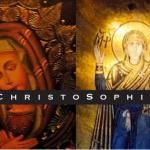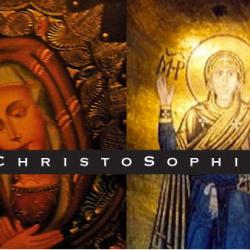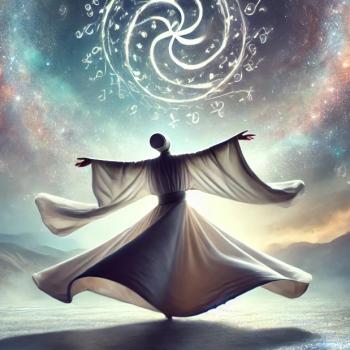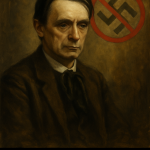My continued exploration of Rudolf Steiner’s life naturally draws attention to the mysterious circumstances surrounding his death.
Rudolf Steiner (1861–1925), was one of the most original spiritual thinkers of the modern era—a philosopher, educator, and mystic whose work laid the foundations for Waldorf education, biodynamic agriculture, and the esoteric path of anthroposophy. He spoke not just to minds but to souls, offering a vision of human evolution grounded in spiritual science.
But Steiner’s work also attracted enemies. In the politically volatile years following World War I, as nationalism, anti-Semitism, and authoritarian ideologies gained momentum in Central Europe, Steiner’s universalist message—and his opposition to racist doctrines—put him at odds with rising proto-fascist factions. He criticized ethnonationalism, called for spiritual freedom, and warned of powers that opposed humanity’s conscious development.
On March 30, 1925, Steiner died after a long illness. Yet nearly a century later, a persistent undercurrent of speculation flows through certain esoteric circles: Was his death merely the result of natural causes—or was he silenced by forces aligned with the nascent ideology that would become Nazism?
This article explores that unsettling question, tracing the historical, esoteric, and symbolic threads of a theory that refuses to disappear.
Tensions with Early Nazi-Aligned Factions
In the early 1920s, Steiner publicly criticized growing nationalist and anti-Semitic movements in Germany. He was denounced in right-wing publications—Dietrich Eckart called him a Jew, and Adolf Hitler attacked his work as “Jewish methods.” Eventually, a lecture of his in Munich was violently disrupted by stink bombs and blackout tactics. That same week, German Foreign Minister Walther Rathenau, a friend of Steiner’s, was assassinated by nationalist extremists .
Steiner acknowledged the danger. He once remarked: “There are definite powers that do not want this work to continue.” Though he did not directly accuse any group, the threats were unmistakably real.

Steiner in the political halls of Berlin
Sudden Illness and Esoteric Interpretation
By late 1924, Steiner fell gravely ill—some anecdotal accounts suggest his decline was abrupt and alarming. In addition, he began to feel ill immediately after taking tea with friends ,and expressed concern for the others that had taken the tea as well. He then refused to rest and continued writing despite his condition. Scholars and followers have speculated that he may have been deliberately poisoned, though there is no forensic or medical evidence to support this claim.
Among Steiner’s inner circle, the idea of a spiritual “occult war” was well established. One writer framed the context starkly: “The path of… hitler and the whole Nazi movement… symbol of the sun… unconscious vessel for Sorathic powers”—a reference to antithesis-aligned cosmic forces in Steiner’s cosmology .
Hypotheses by Esoteric Writers
� Thomas Meyer (and contemporary esoteric interpreters)
Thomas Meyer, a modern anthroposophical author and publisher, suggests that Rudolf Steiner’s death may have involved deliberate poisoning. Citing remarks from Steiner’s close circle—including Marie Steiner and Ehrenfried Pfeiffer—Meyer presents the theory not as sensationalism but as part of a deeper spiritual and historical inquiry. He notes that Steiner himself may have suspected foul play, particularly following mysterious symptoms after a tea service during the 1924 Christmas Conference. Though lacking forensic proof, Meyer’s view reflects a stream of inner conviction within Steiner’s legacy: that powerful adversaries sought to remove him before his spiritual mission could fully unfold.
� Emanuel Zeylmans van Emmichoven (and first-hand spiritual testimony)
Zeylmans, a physician and biographer of Ita Wegman, chronicled an enduring belief among Steiner’s inner circle that he was poisoned during the final phase of his work. Drawing from personal communications and historical reflection, Zeylmans recounts how Marie Steiner and Ita Wegman reportedly held this view privately for the rest of their lives. He presents the theory not as proven fact, but as part of an esoteric reality—one in which Steiner’s physical suffering mirrored an occult struggle between light and dark forces. For Zeylmans, the notion of poisoning becomes less a clinical accusation and more a symbolic key to understanding the forces aligned against Steiner’s teachings.
In Christ and Antichrist: Understanding the Events of Our Time and Recognizing Our Tasks, Tradowsky postulates that Steiner was engaged in a spiritual battle against early fascist currents. While he does not firmly state Steiner was poisoned by the Nazis, he suggests the possibility that Steiner’s mission was actively opposed—perhaps by occult means or dark-intent politics.
A reviewer of his work described it thus: “a portrait of the presence of evil in the second World War…” and described it as deeply unsettling in its implications .
� Sergei O. Prokofieff (and other anthroposophical commentators)
Although Prokofieff does not lay out an explicit assassination theory, he elaborates on how fascist-aligned occult forces sought to silence Steiner’s path. The hypothesis finds symbolic resonance in the timing: Steiner’s death closely preceded the rise of Nazism, and many see it as more than coincidence.
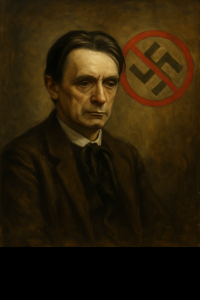
An enemy of Nazism
Mainstream Historical View vs. Speculative Theory
Most traditional historians agree that Steiner’s death was the result of natural causes—likely stemming from chronic stomach issues that had plagued him for years. They point to his intense workload, stress, and self-imposed exhaustion as sufficient explanation for his physical collapse. There are no records of an autopsy or toxicological investigation, nor any contemporary accusations of foul play from medical personnel.
My Conclusion
In esoteric circles, the question of Steiner’s death still lingers. We should take very seriously the fast that Marie Steiner and Ita Wegman (the former Steiner’s wife and the latter his physician) believe he was poisoned, holding that view for the rest of their lives.
That being said, Steiner’s death feels less like the end of a biography and more like a moment within a larger spiritual conflict—one between the forces of evolution and those that would pull humanity backward. In that sense, whether or not Steiner was physically poisoned becomes less central than what his death symbolized to those who saw in him a kind of spiritual illusionary—someone who stood himself as a Guardian of the Threshold in a changing world, confronting the destructive ideologies that were giving birth to the calamities of the 20th century.


